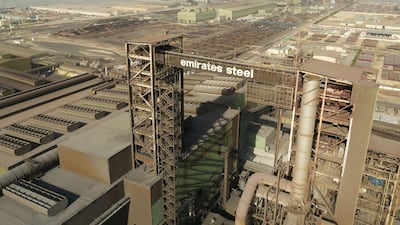Emirates Steel is purchasing local scrap material for use as a feedstock in steel production in a move to support UAE traders.
The company, which is a subsidiary of ADQ, is planning to purchase more than 1 million tonnes of scrap material annually at international prices, it said on Tuesday.
Emirates Steel’s decision follows a recent announcement by the Ministry of Economy to temporarily ban scrap iron exports from the UAE in order to help local steel producers gain easy access to the raw material for their manufacturing operations.
The decision to suspend exports came into effect on May 15 and is valid for four months, according to a notification from the Ministry of Economy. The move came in the wake of the coronavirus pandemic and could be extended further, the ministry said.
“The company is committed to supporting the steel industry value chain and will ensure we stand by the Ministry of Economy decision to prevent the export of scrap materials that are considered prime feedstock in manufacturing steel,” Saeed Ghumran Al Remeithi, chief executive of Emirates Steel, said.
“Moreover, as scrap is turned into an added value product, manufacturers are forced to import it from abroad at high prices because it is an important component in many industries. Currently, the local steel industry needs the entire local scrap business to sustain its operations.”
Currently, scrap accounts for 30 per cent of the raw material in the company’s Steel Making Plant One (SMP1) and Emirates Steel is aiming to increase the usage of scrap as a feedstock in other steel making plants as well.
In 2017, the company commissioned its 3,000 horsepower Steel Scrap Shredding Facility to feed the electric arc furnaces of its steel making plants. The facility plays a key role in recycling steel scrap generated in the UAE, while mitigating waste.
“The UAE steel industry needs protection, especially with challenges it faces, including [a] sharp reduction in steel demand, slowdown in construction activity and restriction on exports", Mr Al Remeithi said.
“The majority of countries in the world are protecting their steel national industry; we need to apply reciprocity on our open market by imposing customs duties on steel imports.”
In 2019, Emirates Steel used 280,000 tonnes of scrap material due to difficulties in sourcing the material from the local market. Currently, the UAE is Asia’s second-largest scrap exporter after Japan, and accounts for 1.6 per cent of the world’s ferrous scrap exports. India, Pakistan and Oman are among the top importers of scrap from the UAE.
The UAE has a scrap reserve of 1.5 million tonnes per annum.
Established in 1998, Emirates Steel has a production capacity of 3.5 million tonnes per annum and exports its products to more than 40 countries worldwide. It supplies 60 per cent of the domestic steel market with finished products including wire rods, rebars, heavy sections and sheet piles.
The company last year said the escalating trade war between the US and China is denting regional and global demand for steel, forcing it to rationalise its cost base to offset the impact of slower sales.
The steel sector is also facing challenges globally following an imposition of a 25 per cent levy by the US administration in 2018 on all imported steel into the country. A legal challenge to the tariffs brought by US steel importers was dismissed by the Supreme Court on Monday.


